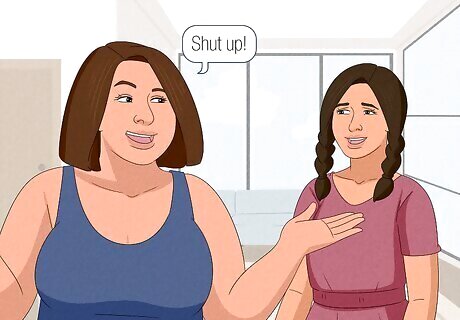
views
Is "shut up" a bad word?

"Shut up" isn’t generally considered as a curse word, but it is rude. Sure, "shut up" is "bad." Is it "bad" in the way that saying the F-word is "bad"? Many people would say no—but it's still pretty darn rude if it’s being said in a serious, angry, or upset way. For all intents and purposes, you might consider "shut up" to be a "diet curse word": it's rude, but not so offensive that you need to replace any letters with asterisks or bleep it out on television. Is saying "shut up" a sin, according to the Bible? Well, technically speaking, "Thou shalt not say 'shut up'" doesn't appear in the Bible, but "Do unto others as you would have them do to you" does (it's the golden rule, which Jesus said in Matthew 7:12). If your feelings would be hurt by someone telling you to "shut up," then you shouldn't say it to anyone else, either!
Is it ever OK to say "shut up"?

It's generally always considered rude to say "shut up" seriously. There's really no beating around the bush: even though most people might not view "shut up" to be a curse word in the same way as "d*mn it" or "shut the f*ck up," it's still pretty offensive. How would you feel if you were trying to tell someone something, and they just said, "Shut up"? You'd probably feel pretty lousy. In fact, you could make the argument that it's worse than a simple "f*ck!" because when you tell someone to "shut up," you're being really disrespectful towards them specifically. Even when you're in the middle of an argument, and you're already angry at someone, telling them to "shut up" is likely to just make things worse, and as certified image consultant Sheila A. Anderson cautions, "How you conduct yourself during difficult conversations says a lot about your character and trustworthiness." Best to avoid it! Want to break the "shut up" habit? Check out our guide to "How to Stop Swearing" and "How to Replace Swear Words with Less Offensive Words." (Even though "shut up" isn't generally considered a "swear," it's not a great habit to have!)

It’s usually OK to say "shut up!" to convey excitement or disbelief. In casual situations, people sometimes say "shut up!" to show that they're surprised or really, really excited about something. It's generally OK to say this to friends or casual acquaintances, but not so much to your boss, teacher, or parents. Example: Dave: "Sabrina Carpenter's coming here on tour soon! We've got to get tickets!"Clark: "Shut UP! She is not! We've got to go!!!!"

It might be OK to tell friends to "shut up" jokingly. If you're hanging out with your good friends and everyone's joking around, you might say, "Shut up!" while giggling when your bud says something dumb and silly. In this scenario, it's generally considered acceptable to say. Example: Sonja: "Ginny just looooooves Rhonda, don't you, Ginny?"Ginny: "Ugh, shut up, Sonja!" Even when saying "shut up" casually to friends, pay attention to their reactions: if they seem taken aback by your casual use of "shut up," they might not have realized you were joking around, or they might have realized but took offense anyhow. If you do use "shut up" in a joking way with your buds and they don't like it, reassure them that you weren't being serious, but that you won't use it again around them. EXPERT TIP Carolyn Powery Carolyn Powery Business Etiquette Expert & Personal Image Branding and Confidence Coach Carolyn Powery is a certified Business Etiquette Consultant and Image Coach based in West Palm Beach, Florida. As the founder of Prestige Etiquette and Image Consulting, she has over 16 years of experience helping provide clients with tools needed for success in any social or business environment. Carolyn is certified in Business, Social, and Children’s Etiquette from The Etiquette Institute, making her services ideal for business professionals, entrepreneurs, college students and children. Prestige Etiquette and Image Consulting LLC is a member of The Etiquette Institute. Carolyn Powery Carolyn Powery Business Etiquette Expert & Personal Image Branding and Confidence Coach It’s important to consider how others feel. Reflect on a time when someone was impolite to you and how that made you feel. If you think about it that way, it can help you be more conscious of how you treat people and how you present yourself in different settings.



















Comments
0 comment